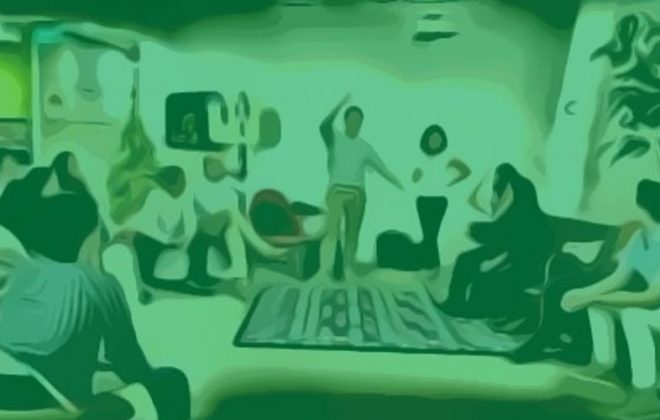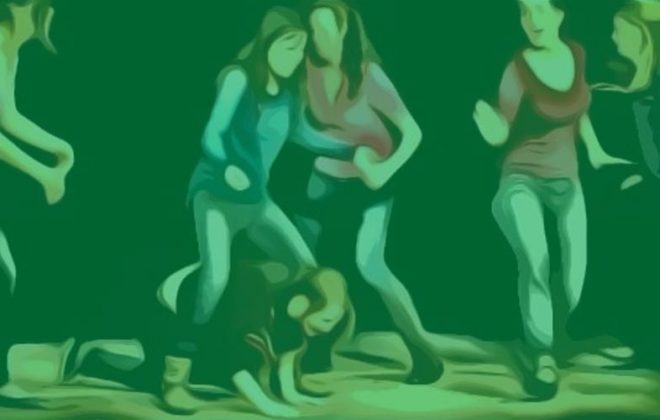
Child’s Play: Life conditions us not to be silly – Improv reteaches us how
Lisa cupped her hands in the air as though she were holding a baseball. She explained to the group that she was holding an invisible ball of energy which she passed along to the people sitting around the circle. Each individual could mime an action with the invisible ball (dribbling, juggling, etc.) before passing it along. It is one of the simpler improv warm ups, but to most adults the willingness to engage in imaginative play is difficult to summon.
As children, the impulse to “play,” or to act on imagination without inhibition or fear of judgement, comes easily to us. A stick found on the ground can easily become a sword or a magic wand. But as we age fear and insecurity condition us to suppress our imaginative instincts, and it can become difficult to permit ourselves to indulge in playfulness. While this phenomenon may seem like a mere unfortunate side effect of maturation, in reality it is a dangerous process which can be hard to reverse.
Brene Brown, a research professor at the University of Houston, recently quoted play theorist Brian Sutton-Smith in a tweet reading: “The opposite of play isn’t work. It’s depression.” According to Brown and Sutton-Smith, play is not a frivolous distraction from the seriousness of work, but it is rather a necessary activity to keep us mentally and socially fit. The act of engaging in imaginative play increases empathy, improves creativity and gives us a mental break from stressful thoughts. Though it can often be difficult for adults to find the willingness and time to play.
The group typically has a wide age range – from young adults to septuagenarians – but on this morning the group was joined by two young boys aged approximately 5 and 8. As Lisa began to pass the invisible ball of energy there was immediate hesitation from many of the adults present. Most reacted slowly, saying “Oh, is it my turn?” before interacting with the imaginary ball. The act of playing pretend felt foreign. Then one of the little boys shouted “Pass it to me!”
The adult in possession of the “ball” turned and smiled. Most of those in the circle smiled as well. The ball was passed toward the young boy who immediately “caught” it and began dribbling in front of his chair, imagining himself an NBA All-Star. There was no fear or judgement in this 5 year old boy; he dribbled his imaginary ball as if he could see it there right in front of him. The adults in the circle smiled wider and cheered him on. “Pass it to someone else,” said a voice from the circle. The boy turned to an older man across the circle and mimed a 3-point shot with his imaginary basketball. The man received it with no hesitation.
The game was still difficult for most of us in the group, and there were often moments of doubt as people questioned, “were you throwing it to me?” The fear of being “wrong” or making a mistake is hard to overcome. But all those present seemed to find great joy in returning the ball to the young boy and watching him play. The innocence and willingness to pretend that was abundant in the child was also contagious throughout the group.
The presence of children often has such an effect on adults. Lisa pointed out during the workshop how difficult it can often be for adults to speak in gibberish or use an absurd voice in her improv lessons. Yet when speaking to babies or children many of us naturally lift our voices an octave or mimic the nonsense babblings of a young child. Interacting with a human being who has not yet been conditioned out of their silliness helps us to recapture our own.
A few example modules include:
- Magic Words: Communication and “Yes, And”
- On the Spot: Public Speaking and Performance Anxiety/Stage Fright
- Heal Thyself: Humor and Self Care
- Let Go: Stress Reduction Through Improv
- Us is More: Group Mind and Team-Building
- Feelin’ It: Emotional Intelligence and Empathy
- and many more . . .
Tags In
Categories
- Advocacy (1)
- Articulate (2)
- From the Advisory Board (1)
- Improv (13)
- Improv and Children (6)
- Improv Exercises (28)
- Improv Life Lessons (23)
- Interviews (2)
- ITG Blog (29)
- ITG Games and Exercises (26)
- ITG Podcasts (3)
- Look Who Gets It (10)
- Meditation (1)
- Neuroplasticity (5)
- Self-Care (9)
- Storytelling (3)
- Teamwork (6)
- Therapy (5)
- Yes, and (13)





